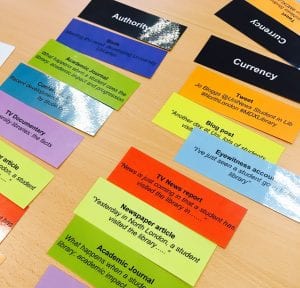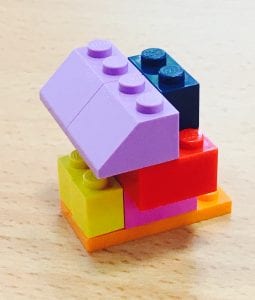CPD25 Games without frontiers: Enhancing engagement, interaction and reflection
By Gillian Mackenzie, on 22 May 2017
I recently attended a CPD25 workshop, which was run by library staff from Middlesex University. At Middlesex, they have increasingly been using games and other play related activities to enhance information literacy teaching, training and in staff development. This so-called ‘gamification’ introduces elements such as decision making, teamwork, competition and problem solving into sessions, making lessons less about traditional teaching and more about learning by doing and supporting discussion.
During the workshop, we were invited to try out some examples of games they use at Middlesex, including one which aims to encourage students to evaluate information sources in terms of their currency (how up-to-date they are) and authority (how reliable a source is).
We were also introduced to the Lego Serious Play method, which encourages participants to think creatively using metaphor, problem solve and communicate ideas. For example, in our first task, everyone was given the same eight Lego bricks, and we were asked to use them to build a duck in two minutes. This exercise was to encourage us to have ownership over what we built (in other words, even if it didn’t look like a duck, it was a duck if we said it was) and to show that individual variations on a theme are almost endless (as there were multiple different ways to assemble the eight bricks). In small groups, we also attempted to build the tallest Lego tower in two minutes – a simple team building exercise to demonstrate the importance of group cooperation.
In the last part of the workshop, we were invited to try and develop our own games. I found this task quite challenging, as I couldn’t see exactly how we could incorporate these ideas into training sessions at UCL, but the course has given me things to think about. Treating students as learners and not the taught, encouraging engagement and discussion, are all elements that I would keep in mind when developing training courses in the future.
Finally, I also attempted to use the PechaKucha presentation format (20 slides, 20 seconds per slide) to talk about this course in our most recent team meeting. My effort was a little shambolic, but it was an interesting, informal way to give brief feedback to the LaSS team on what the course was about, and it seemed to be well received.
Leave a Reply
You must be logged in to post a comment.
 Close
Close




